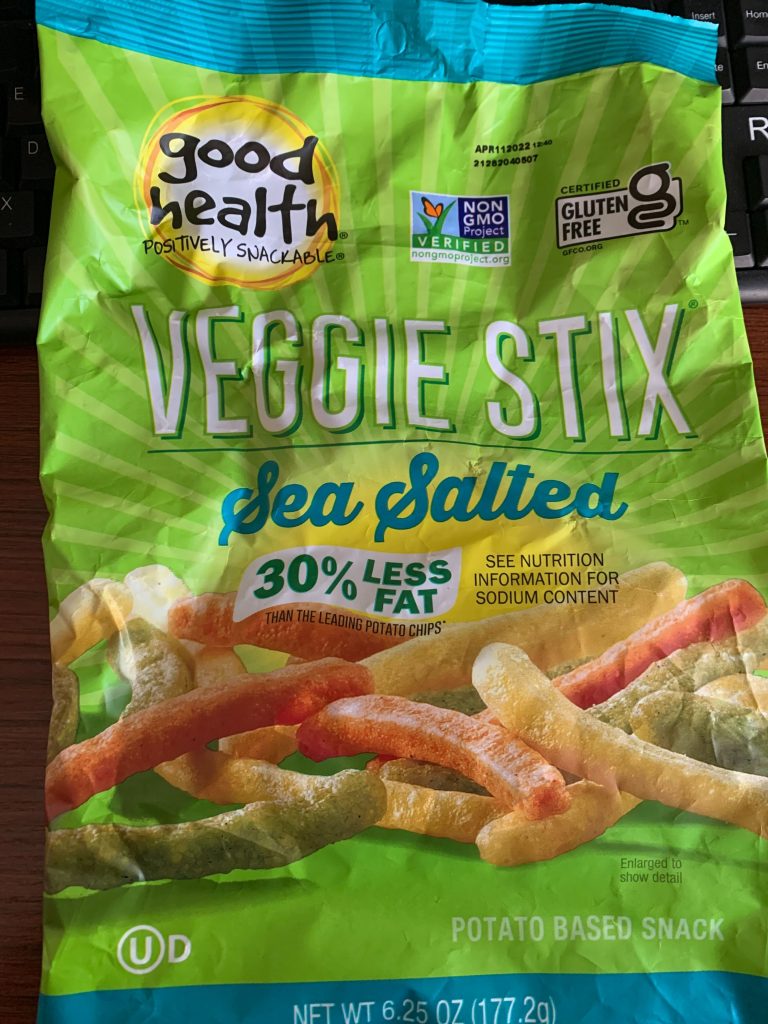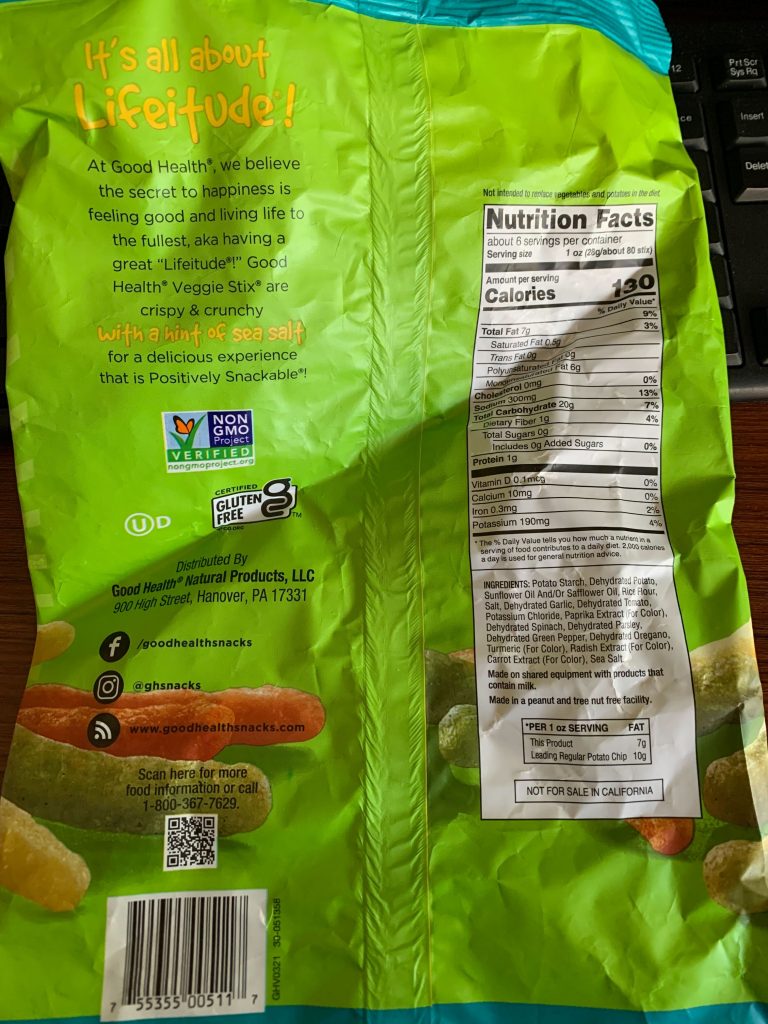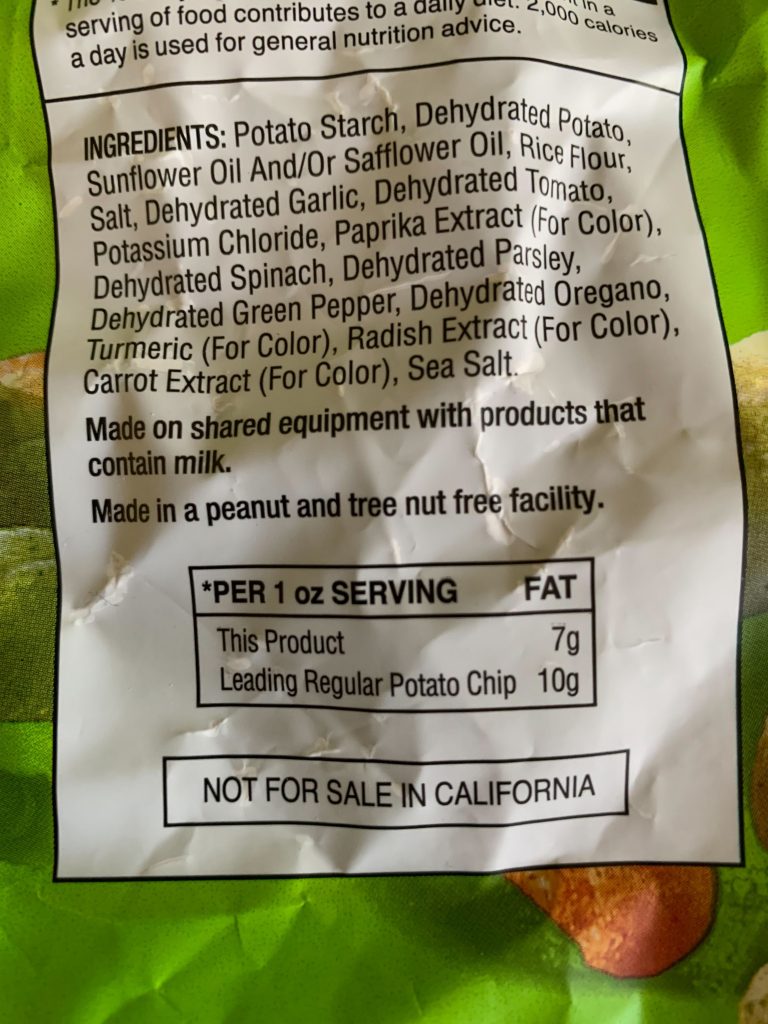Why Can’t Californians Buy This Snack?

The very wrinkled bag pictured above is a snack called “Veggie Stix,” made by a company called Good Health Natural Products LLC in Hanover, Pennsylvania. The packaging screams “healthy” at you — “30% less fat” and “certified gluten-free” and “non-GMO verified” and “veggie” and “good health” are all there to suggest, probably incorrectly, that you can eat these all day long without a problem.
Again, that’s probably not the case. They’re relatively high in sodium — 300 mg per serving — and the veggie stix lack any sort of nutritional value, as seen on the back of the package, below.

But it’s not the sodium, or the calories, or the near-zero amounts of protein that probably caught your eye. Nope. The most interesting part of the Nutition Facts is in the small box at the bottom. Let’s zoom in:

In all capital letters, it reads: “Not for Sale in California.”
That’s a really weird thing for a bag of potato chips (sorry, “veggie stix”) to be telling consumers, especially ones like me who are in New York, not California. These snacks are also not for sale on Mars, despite the fact that you can grow potatoes there (according to The Martian, at least), nor is it likely that they’re for sale in, say, Russia or Antarctica or Point Nemo. But it doesn’t say “Not for Sale on Mars.” Why bother telling me that I can’t find them in stores in San Francisco or LA?
Well, for one, it will probably help the Good Health Natural Products company from being sued.
Potato chips contain a chemical called acrylamide. If you’ve never heard of acrylamide, you’re probably not alone. The Food and Drug Administration describes it, nonchalantly, as “a chemical that can form in some foods during high-temperature cooking processes, such as frying, roasting, and baking.” Most commonly, acrylamide is found in fried potato products — chips, fries, and yes, “veggie stix.”
And it may be dangerous. In lab tests, mice that were fed very high amounts of acrylamide ended up developing cancer, so as a result, various food safety boards have been studying the chemical for more than a decade. And whether eating foods with acrylamide is likely to cause cancer is still an open question. The American Cancer Society sums up the findings:
Since the discovery of acrylamide in foods in 2002, the American Cancer Society, the US Food and Drug Administration (FDA), the World Health Organization (WHO), the European Food Safety Authority (EFSA), and many other organizations have recognized the need for further research on this topic. So far, reviews of studies done in groups of people (epidemiologic studies) suggest that dietary acrylamide isn’t likely to be related to risk for most common types of cancer. But ongoing studies will continue to provide new information on whether acrylamide levels in foods are linked to increased cancer risk.
As of this writing, most places haven’t regulated the use of acrylamide in foods, with one major exception: you guessed it, California. In 1986, the state passed the “Safe Drinking Water and Toxic Enforcement Act,” more commonly known as Proposition 65. The law (you can read it here if you’d like) requires businesses to warn customers if their product or service may expose the customer to a known carcinogen. Every year, California updates the list of what it considers a known carcinogen, and in 1990, it added acrylamide to the list. And while the state’s website notes that “levels in food are generally well below the levels currently believed to cause these harmful effects,” if your food product is above that level, you need to put a warning on it.
The text of that warning, though, is pretty ominous-sounding. Here’s a picture of another brand of potato-based snacks which, unlike our veggie stix, contain the warning. If you don’t want to click through, though, I’ll share the text here: “Consuming this product can expose you to chemicals including acrylamide, which are known to the state of California to cause cancer. For more information, to go www.p65warnings.ca.gov/food.” That’s pretty scary sounding, so you could see why manufacturers of potato chips often decided to just not bother with the disclosure.
And before 2005, many of them just ignored the law. But that year, California’s attorney general decided to take action — which is to say, he sued. As Consumer Affairs reported, Attorney General Bill Lockyear came after a who’s-who list in the potato-foods biz: Burger King, McDonald’s, Heniz, Frito-Lay, Wendy’s, Pringles, KFC, and others, arguing that these companies needed to either reduce the levels of acrylamide in their foods or provide warnings to consumers. In 2008, per Reuters, most of the companies settled their cases by agreeing to fines and/or to cut the acrylamide levels. None of them, though, added the “this may give you cancer, says California” warning to their packaging. And that makes a lot of sense. While Prop 65 signs are everywhere in California (to the point where most consumers ignore them), Prop 65 warnings aren’t common anywhere else. Seeing one on the label of your potato chips while walking through a grocery store in New York may stop you from buying the snack.
That’s probably what Good Health Natural Products was thinking when they came up with their labels seen above. If you’re marketing your snack as the healthy, gluten-free, non-GMO, lower fat option, you simply can’t also have it say “may cause cancer” on the label, too. The easier solution is to just not sell your product in California. But there’s really no way of doing that; a deli owner could buy a case of Veggie Stix in Oregon, drive a few minutes south, and sell them at her store in the Golden State. The solution for Good Health: label the product to make it clear that their stix are “not for sale in California.”
To date, the California Attorney General’s office hasn’t gone after any manufacturers who have tried this trick.
Bonus fact: There’s another brand of potato chips that you can’t buy in California but, oddly enough, is more common there than in most other places. That brand? “Let’s Potato Chips,” a loose reference to “Lay’s.” The “Let’s”-brand isn’t a real product; it’s one used in television and movie production (so, common on LA sound stages) to avoid accidental product endorsements or copyright/trademark infringement. As Buzzfeed demonstrated in a 2013 photogallery, you’ll find the brand in many of your favorite shows, including Arrested Development, Community, and Orange is the New Black.
From the Archives: The Green Versus the Eardrums: The environmentally-friendlier potato chip bags that were deafeningly bad.
